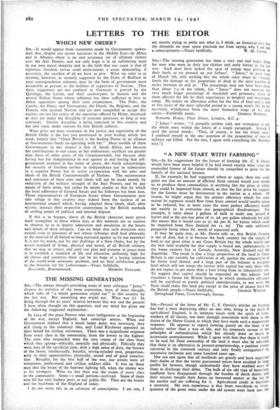A NEW START WITH FARMING "
SIR,—In his suggestions for the future of farming Mr. C. S. Orwin would have been more helpful if he had stated exactly what crops his controlled farmer of the future should be compelled to grow for the benefit of the national interest.
If, for example, he had suggested wheat or sugar, then one could point out that no amount of efficient State control would ever enable us to produce these commodities at anything like the price at which they could be imported from abroad, so that the fair price he suggests for the farmer must be detrimental to the nation as a whole. Of course, he might argue that the greater efficiency which for some reason he supposes would flow from State control would enable prices to be reduced, but in most cases the most perfect efficiency would not enable us to overcome our geographical disadvantages. For example, it takes about 3 gallons of milk to make one pound of butter and at the pre-war price of Is. 2d. per gallon wholesale for milk this means that it would cost us 3s. 6d. per lb. for butter which could be imported from New Zealand for as. 6d. The only additional perquisite being about 6d. worth of separated milk.
It may be quite true, as Mr. Orwin tells us, that British farming is out of date, but it is because the back country for the supply of food to our great cities is not Great Britain but the whole world, and the best land available for that supply is found not, unfortunately, in the home country but in Canada, Australia, New Zealand and the Argentine. The result is that a large proportion of the land in Great Britain is not suitable for cultivation at all, against the competition of far better land abroad, and a large part of the balance is marginal land which will not tempt the farmer with capital but only those who do not expect to get more than a bare living from its inhospitable soil. To suggest that capital should be expended on this inferior land visualises a future for British farming in which productive efficiency will be sacrificed to purely political considerations, as not even the State could make this land pay except at the price of dearer food for
the British people.—Yours faithfully, GEORGE WINDER. Springhead Farm, Crow borough, Sussex.






























 Previous page
Previous page